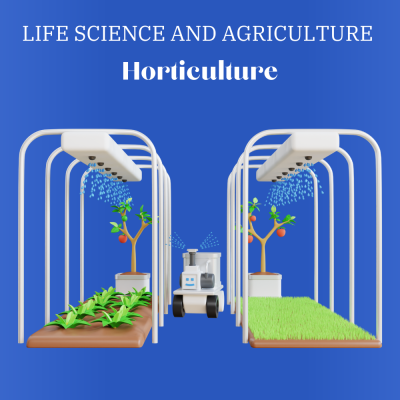

Horticulture
Horticulture is a field of agriculture concerned with the cultivation, management, and study of plants, including fruits, vegetables, flowers, ornamental plants, herbs, and trees. It includes a variety of methods intended at improving plant growth, productivity, and quality, such as plant propagation, breeding, crop production, pest and disease management, soil management, and postharvest handling. Horticulturists use scientific knowledge and procedures to improve plant health, increase agricultural yields, and create new kinds with desirable characteristics like disease resistance, flavour, and attractiveness. Horticulture is essential for producing fresh vegetables, beautifying landscapes, maintaining biodiversity, and fostering environmental sustainability. It covers a wide range of industries, including fruit and vegetable production, floriculture, nursery management, landscape design, urban horticulture, and botanical gardens.
University
40+
Duration
3 to 4 years
Eligibility
Intermediate
Program overview
Welcome to our in-depth resource on India's horticulture course options. Growing fruits, vegetables, flowers, and ornamental plants is the science and art of horticulture, and it is essential to both environmentally friendly agriculture and sustainable farming. We'll go over the many facets of studying horticulture in India in this guide, including educational options, employment opportunities, and the role horticulture plays in solving global issues.
Why Study Horticulture?
agriculture and plants. Students who study horticulture acquire information and abilities in plant biology, agricultural production, pest control, and environmentally friendly farming methods. Furthermore, horticulture is essential to solving urgent global concerns including climate change resistance, environmental sustainability, and food security.
Horticulture Courses in India:
Undergraduate, graduate, and doctorate programmes are among the educational levels at which horticulture courses are provided in India. Plant breeding, crop physiology, nursery management, landscape design, and post-harvest technology are just a few of the many topics covered in these courses. There is a horticulture course that is appropriate for your hobbies and career aspirations, regardless of your interests in commercial farming, landscaping, research, or entrepreneurship.
Undergraduate Programs:
Students can pursue Bachelor of Science (B.Sc.) degrees in Agriculture or Horticulture with a specialisation in Horticulture at the undergraduate level. These courses give students a solid foundation in plant sciences, soil management, irrigation techniques, and pest control. They usually last three to four years. Undergraduate horticulture programmes must include practical training through internships and fieldwork.
Postgraduate Programs:
Numerous universities and agricultural institutions throughout India offer Master of Science (M.Sc.) programmes in Horticulture for individuals interested in pursuing further education. These courses go deeper into specialised fields like floriculture, pomology, olericulture, and medicinal plants. Under the supervision of seasoned faculty members, postgraduate students can work on research projects and theses, advancing the fields of horticultural science and technology.
Doctoral Programs:
Doctorate (Ph.D.) programmes in Horticulture are available for those who want to work in academia or as researchers. Ph.D. candidates do innovative research on sustainable agriculture, biotechnology, plant breeding, and crop enhancement. These three- to five-year programmes give students the knowledge and abilities necessary to handle challenging problems in horticulture and related sectors.
Career Opportunities: ..
Graduates of horticulture programs in India have diverse career opportunities in various sectors, including:
- Agribusiness and Farm Management
- Horticultural Research Institutes
- Government Departments and Agricultural Extension Services
- Landscape Design and Urban Planning
- Floriculture and Ornamental Plant Industry
- Food Processing and Post-Harvest Management
- Environmental Conservation and Sustainability Organizations










Right Location, Affordable Fees And Right Education!

